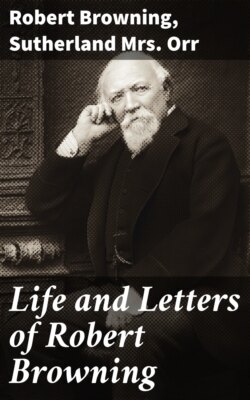Читать книгу Life and Letters of Robert Browning - Robert Browning - Страница 35
На сайте Литреса книга снята с продажи.
Оглавление* Mr. Browning's memory recalled a first and last effort at
preaching, inspired by one of his very earliest visits to a
place of worship. He extemporized a surplice or gown,
climbed into an arm-chair by way of pulpit, and held forth
so vehemently that his scarcely more than baby sister was
frightened and began to cry; whereupon he turned to an
imaginary presence, and said, with all the sternness which
the occasion required, 'Pew-opener, remove that child.'
It would be far less surprising if we were told, on sufficient authority, that he had been disturbed by hankerings for the stage. He was a passionate admirer of good acting, and would walk from London to Richmond and back again to see Edmund Kean when he was performing there. We know how Macready impressed him, though the finer genius of Kean became very apparent to his retrospective judgment of the two; and it was impossible to see or hear him, as even an old man, in some momentary personation of one of Shakespeare's characters, above all of Richard III., and not feel that a great actor had been lost in him.
So few professions were thought open to gentlemen in Robert Browning's eighteenth year, that his father's acquiescence in that which he had chosen might seem a matter scarcely less of necessity than of kindness. But we must seek the kindness not only in this first, almost inevitable, assent to his son's becoming a writer, but in the subsequent unfailing readiness to support him in his literary career. 'Paracelsus', 'Sordello', and the whole of 'Bells and Pomegranates' were published at his father's expense, and, incredible as it appears, brought no return to him. This was vividly present to Mr. Browning's mind in what Mrs. Kemble so justly defines as those 'remembering days' which are the natural prelude to the forgetting ones. He declared, in the course of these, to a friend, that for it alone he owed more to his father than to anyone else in the world. Words to this effect, spoken in conversation with his sister, have since, as it was right they should, found their way into print. The more justly will the world interpret any incidental admission he may ever have made, of intellectual disagreement between that father and himself.
When the die was cast, and young Browning was definitely to adopt literature as his profession, he qualified himself for it by reading and digesting the whole of Johnson's Dictionary. We cannot be surprised to hear this of one who displayed so great a mastery of words, and so deep a knowledge of the capacities of the English language.
